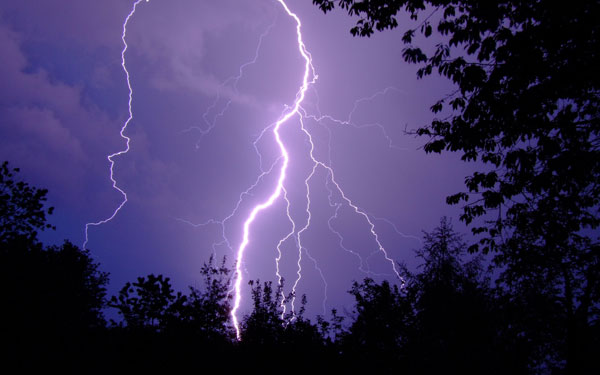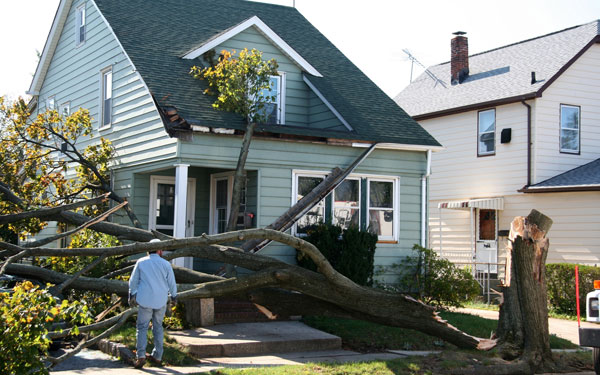 by Kimberly Blackford
by Kimberly Blackford

The deadly storms, tornadoes and hurricanes that ravage the country each year are constant reminders that Mother Nature has a temper. These storms begin somewhat innocent so they seem, but each year no matter how many safeguards are in place, communities all across America are stripped of their resources, people and their livelihoods in the blink of an eye. It is heartbreaking to see so many people affected time and time again when it seems there are so many precautions that can be taken to ensure people aren’t killed and possessions aren’t lost.
No matter how many safety measures are in place in any town or community, it is always a terrific idea to be reminded of ways we can prepare for the deadly storms ahead, what to do during the event to remain safe, and the precautions that should be taken in the storm’s aftermath.
Before The Storm
Whether it’s a tornado or a hurricane, being prepared will keep your family, pets and possibly valuables safe from harm’s way in the case a deadly storm strikes. Some of the things you should always have prepared and ready in case of violent weather include:
- Create an emergency supply kit including medications and medical supplies for up to two weeks. You can even take this a step further and include clothing, food, and water.
- Review insurance policies and include an extra copy of the policy in your supply kit along with any extra copies of other important paperwork.
- Review your evacuation plan and have solid decisions in place of where you and your family will stay if you do need to leave your home or have no home to return to. Also, it is important to inform family and friends of your plan so they will know your whereabouts after a weather tragedy. And, remember if you have pets, be sure that your plan includes their safety as well since many storm shelters will not allow animals.
- If you plan to cover your doors and windows in the event of a hurricane, it can be wise to do a test run and be sure your installation efforts are strong enough and will not warp.
- If a major storm is imminent, especially a hurricane, tape the inside of large paned windows with an “X” along the full length of their diagonals. This keeps glass flying everywhere if the window break or crack.
- Always keep at least one battery-powered flashlight where it can be located by all those who live there. Even better, keep in the same spot a battery-powered radio for further weather information. And, remember fresh batteries for both in the exact same spot.
- Perform a roof check before any leaks appear. Water damage results in the highest expense for homeowners who have storm repairs to their home. Take a set of binoculars and scan the outside of your roof. Loose or damaged shingles or missing nails will be clues that damage may have been done. On the interior, if you see water stains in your attic, on your ceilings or around your windows, chances are you have experienced water damage that will need to be repaired.
- Before storm season, take a walk around your yard and even look at your neighbor’s yard. Trim any foliage that puts your home or neighboring houses in jeopardy and also pay close attention to any trees that are dangerously close to power lines. These should be trimmed as well. If you feel uncomfortable doing this task, hire a professional.
- Install surge protectors throughout your home to plug your electronics, media equipment and appliances into so they do not get damaged during an electrical storm and heavy lightning.
- Be sure to have one phone in the house that does not require electricity to operate. This includes cordless phones and phones attached to answering machines. You will need a traditional analog phone or a cell phone.
- Sign up you and your family for first aid and CPR classes. Many local hospitals and the American Red Cross provide such services and everyone will feel much more at ease if they know how to react in the event of an injury.
- If the weather forecast has been threatening nasty weather all week, do yourself a favor and make sure you have a full tank of gas. If the storm approaches quickly and there’s a sudden loss of power, gas pumps will not be in service.
- As a storm approaches and the local news begins to display warnings in nearby areas, but not in your area just yet, be sure to remove items outside your home that could become airborne in strong winds. Securely anchor or take indoors.
- With a storm within sight or being reported, move into an interior room without windows or a room in the basement if you have one. Cover your head and chest if possible. Find a place under immobile furniture and wrap blankets and pillows around yourself to avoid sharp glass, nails and other projectile objects. Also, if you are in the basement be mindful of where the large pieces of furniture and other objects may be on the first floor above you and avoid the basement space right below them.
During The Storm
- Immediately before or during a storm do not take a shower or bath. This will help avoid any choice of electrical shock.
- Stay away from windows where flying debris can cause sudden injury. Do not use the phone if possible.
- Close all blinds and draperies in the event your windows do begin to break. At least there will be some minimum protection from blowing glass and outdoor debris.
- Don’t go out in a hurricane, but if you feel threatened by rising waters, then seek higher ground and follow instructions given by civil defense personnel.

After The Storm
- Keep away from any downed power lines. Sometimes downed wires may still spark and snap, so they can be very dangerous even if they don’t look that way. If anyone you know experiences electrical shock, then call 911 or your local emergency service immediately.
- Approach all fallen items and debris with extreme caution especially those that are metal. Downed power lines may be hiding within the debris.
- Stay out of heavily damaged houses since they could possibly collapse at any time.
- Do not use matches or lighters in case leaking gas pipes or fuel happen to be nearby.
- If you are using a generator after the storm, never hook it to your home’s electrical system. Connect appliances directly to the generator with properly sized power cords. Always make sure the generator is grounded and ready for safe use. And remember to use the generator in a well-ventilated area.
- If a power outage lasts longer than a few hours, then turn off your range, toaster oven and iron if indeed the power returns to your home when you are not there.
- Turn off your air conditioner and water heater to prevent system overloads when power is turned back on. Ideally, turn them back on 30 minutes after power has been restored.
- Wear hard-soled shoes if you walk around the outside of your home after a storm. Avoid driving if possible allowing the roads to remain clear for emergency vehicles and personnel.
- Remain as calm as possible and stay alert. Listen for information from local officials, police and other emergency personnel.
The storms we see blowing across the country today have been some of the strongest, most intense storms in history. Be sure your family and loved ones are prepared well before the storm approaches and they make certain they also know how to handle themselves during and after such a destructive event.
Here are some related articles:
- Keeping the Outside Out: Roofing Materials
- Lake House Maintenance Tips
- Protecting Your Home From Storm Damage
- Safe Rooms - Storm Protection Ideas
Save this article to:
back to top